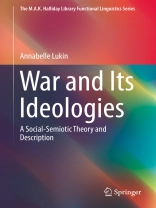Ideology is so powerful it makes us believe that war is rational, despite both its brutal means and its devastating ends. The power of ideology comes from its intimate relation to language: ideology recruits all semiotic modalities, but language is its engine-room. Drawing on Halliday’s linguistic theory – in particular, his account of the “semiotic big-bang” – this book explains the latent semiotic machinery of language on which ideology depends. The book illustrates the ideological power of language through a study of perhaps the most significant and consequential of our ideologies: those that enable us to legitimate, celebrate, even venerate war, at the same time that we abhor, denounce and proscribe violence. To do so, it makes use of large multi-register corpora (including the British National Corpus), and the reporting of the 2003 invasion of Iraq by Australian, US, European, and Asian news sources. Combining detailed text analysis with corpus linguistic methods, it provides an empirical analysis showing the astonishing reach of our ideologies of war and their profoundly covert and coercive power.
قائمة المحتويات
1. Language, Linguistics and Ideology.- 2. The Quest for Meaning in 20th Century Linguistics.- 3. Ideology in a Socio-Semiotic Linguistic Theory.- 4. War and Violence: Etymology, Definitions, Frequencies, Collocations.- 5. Ideology in the Act of Meaning.- 6. A Counter-ideology: War as Violence.- 7. Configurative Rapport: The ‘Existential Fabric’ of War.- 8. Language in the Legitimation of War.- 9. Appendices.- 10. Index.
عن المؤلف
Annabelle Lukin is Associate Professor of Linguistics at Macquarie University. She teaches grammar and meaning, as well as general linguistic theory. She has lectured in China and Latin America, and is a regular commentator on language matters in the Australian media.












